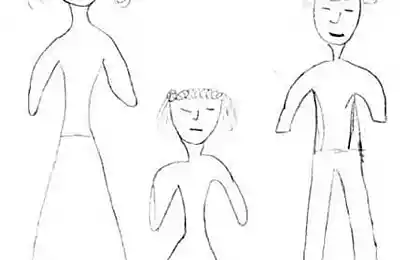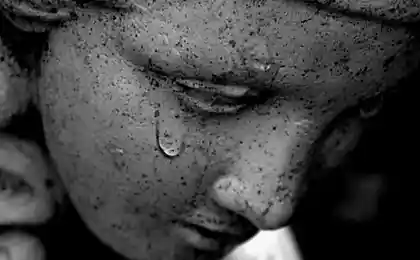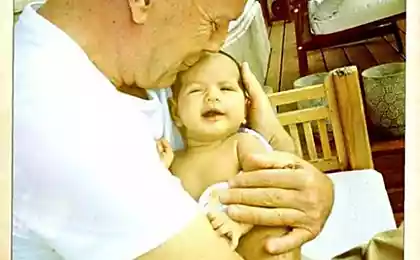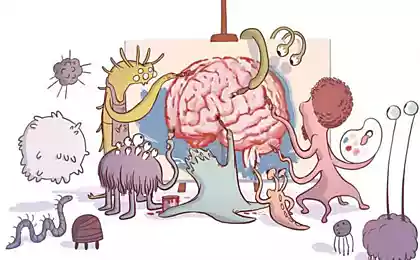538
As the name of the deceased and relatives can affect our lives
Did you know that from your grandfather and psihotravm matter what name you call your parents, depends largely on what is going on with you today? The explanation of this phenomenon has been psihogenealogiya. < Website tells what kind of science, and what useful knowledge she can give us.
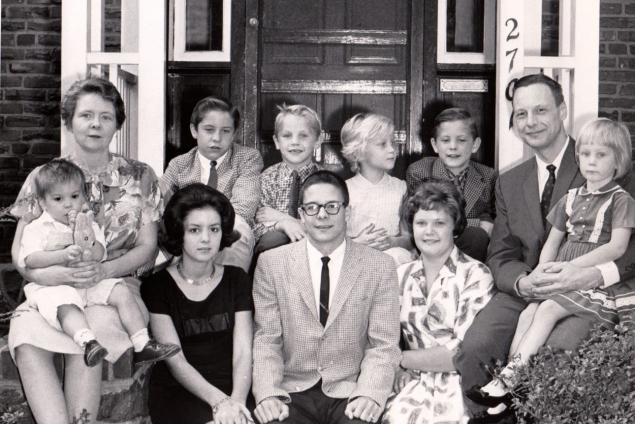
Choice imeniDlya get started is to learn, under what circumstances you got your name. In most cases the parents called the baby after his own father or mother, by the name of the deceased child or a relative of his idol and former lover / mistress.
It's unbelievable, but many experienced therapists will tell you that at some point therapy patient suddenly begins to reminisce about their deceased relatives (such as brothers, sisters and so on. D.), After whom he was named. And consciously or unconsciously draw an analogy with your life as if living the life of the man (at least partially).
In fact it is not so difficult to explain. Psychologists have known for the phenomenon of the so-called mental promise, that unconsciously give parents their children. About him we'll talk later, but one of those promises unconscious is precisely the choice of name. Parents like to "talk" to your child (without words, of course): «We want you to be such a dead relative, the man whom we admire, whom we love, which we remember» Although. good desire of parents, it can even break down their child's life or just to stop him in anything - from career to family life
Silent transmission perezhitogoEsli you're not a psychologist, but are interested in this path, be aware:. the most serious psychological trauma is what silent. A family is often silent. So it is accepted, "why raise unpleasant topics»
. Many people sincerely believe that if something is not to say, and not "think" it will no longer bother. But the point is just that painful subject not only no longer bother - it will become a much more formidable scale than was originally her. Often this silence leads to pathological repetition of similar fate many consecutive generations ( "women of our family always married for alcoholics - this is our cross, so we were not lucky") or to the disease, which can not even cure the doctors, although people on the fifth circle can pass multiple surveys.
Experienced doctors, by the way, in such cases, send the patient to a therapist, realizing that it is a psychosomatic diseases, but not all, patients come to him, and everything starts again.
< It's not luck or absence, and in the hidden "scenarios", unknowingly embedded in us by our parents, and in them -.. their parents, etc. the question is not only that "the child learns what he sees" - more everything is much more complicated.
Imperfect mourning Children accepted cheating, when someone from their loved adult dies, well, or at least not to take to the funeral ( "why a child to look at it "). If you knew unenlightened well-wishers, what kind of injury it is applied so that the child, it certainly would have abandoned this practice.
The loss, which would be a terrible and unbearable it may be, must necessarily be mourned (literally), it is necessary to talk about it with your child. To tell you simply and quietly, without embellishment, unnecessary comforts, you need to be with your child - not only physically, but also mentally, to be considerate and sensitive to his state of mind. < A child needs to take the death of a loved one, and this requires a natural "work of mourning»
Ann Anselin Schutzenberger "When mourning is not perfect, is interrupted," incomplete action ", which makes a person and his descendants" wander "(just as they say that the dough ferments or wine)
. The same can be said about "family secrets" and similar "secret" things. Adopted by, for example, did not report receiving child (if parents took him out of the children of the baby at home), he adopted. Such terrible harm can not be underestimated. If you're ready to take the baby from the orphanage, sure inform him that he was not home, but add that for you it does not matter and that you love it as a mother (but only if this is true if you are honest enough with themselves and feel that it is not so - do not lie:. that you will deal more damage)
. double prinuzhdenieIli double message. It is the bane of almost all (with few exceptions), and grown children from adults them. "I remember a classic case of double compulsion mother offers her son for two birthday shirt - says Anne Schutzenberger. - The next day, the son puts on one of them (blue), and the mother of his repellent - he does not like his mother, because he did not put on another (green). When he puts on the green, the mother pushes him again - he does not like his mother, because he did not put the blue. And when the son puts on two shirts one on another, the mother exclaims: My son - crazy »
! Such promises we see every day everywhere. When a father makes his son to be obedient and not to cry when his curse - and at the same time teaches to hit back the boys in the yard, "You're a man!" When a mother says to her daughter: "Where are dressed up!", "You have to lose weight / nose smaller / bigger eyes / hair thicker and more ", and then complains that her daughter" is still not married, "she behaves" like a man "and so on. d.
Particularly often such parental messages: «Do not live (do not be)» (if it's not you ...; before you were born ... (a story about something good), after you were born ... (a story about something the poor); we wanted a boy, and you were born (and vice versa), etc.), «Do not grow (do not be an adult)» (such good little children !; "I love the little ones.. children, small children are all good, but then ... and we with my dad wanted a divorce, but decided to wait until you grow up, my mother will love you if you're close to her mother, and so on), «Do not be.. a » (we want a healthy baby, but you were born; we wanted a girl, but you were born, we are very experienced the death of the first child and decided to give birth to), « Do not be happy » (situation when parents repeat child about how they have suffered in order to grow his / dress / feed / to give him an education. The child, knowing that suffered so much for him, feels a sense of guilt, but to repay the "debt" can not. Therefore, to be happy, too, he can not; the situation when the child being ill, gets much more love and attention than when he was healthy - in the future it could unknowingly hurt, to be loved), etc. -.. a great many messages parental
. Do not make these mistakes! Be tolerant of one another, have the courage to take the identity of her child, not trying to distort it. < Website I wish you happiness and understanding!
via naked-science.ru/article/psy/psikhogenealogiya-i-semeinye-t

Choice imeniDlya get started is to learn, under what circumstances you got your name. In most cases the parents called the baby after his own father or mother, by the name of the deceased child or a relative of his idol and former lover / mistress.
It's unbelievable, but many experienced therapists will tell you that at some point therapy patient suddenly begins to reminisce about their deceased relatives (such as brothers, sisters and so on. D.), After whom he was named. And consciously or unconsciously draw an analogy with your life as if living the life of the man (at least partially).
In fact it is not so difficult to explain. Psychologists have known for the phenomenon of the so-called mental promise, that unconsciously give parents their children. About him we'll talk later, but one of those promises unconscious is precisely the choice of name. Parents like to "talk" to your child (without words, of course): «We want you to be such a dead relative, the man whom we admire, whom we love, which we remember» Although. good desire of parents, it can even break down their child's life or just to stop him in anything - from career to family life
Silent transmission perezhitogoEsli you're not a psychologist, but are interested in this path, be aware:. the most serious psychological trauma is what silent. A family is often silent. So it is accepted, "why raise unpleasant topics»
. Many people sincerely believe that if something is not to say, and not "think" it will no longer bother. But the point is just that painful subject not only no longer bother - it will become a much more formidable scale than was originally her. Often this silence leads to pathological repetition of similar fate many consecutive generations ( "women of our family always married for alcoholics - this is our cross, so we were not lucky") or to the disease, which can not even cure the doctors, although people on the fifth circle can pass multiple surveys.
Experienced doctors, by the way, in such cases, send the patient to a therapist, realizing that it is a psychosomatic diseases, but not all, patients come to him, and everything starts again.
< It's not luck or absence, and in the hidden "scenarios", unknowingly embedded in us by our parents, and in them -.. their parents, etc. the question is not only that "the child learns what he sees" - more everything is much more complicated.
Imperfect mourning Children accepted cheating, when someone from their loved adult dies, well, or at least not to take to the funeral ( "why a child to look at it "). If you knew unenlightened well-wishers, what kind of injury it is applied so that the child, it certainly would have abandoned this practice.
The loss, which would be a terrible and unbearable it may be, must necessarily be mourned (literally), it is necessary to talk about it with your child. To tell you simply and quietly, without embellishment, unnecessary comforts, you need to be with your child - not only physically, but also mentally, to be considerate and sensitive to his state of mind. < A child needs to take the death of a loved one, and this requires a natural "work of mourning»
Ann Anselin Schutzenberger "When mourning is not perfect, is interrupted," incomplete action ", which makes a person and his descendants" wander "(just as they say that the dough ferments or wine)
. The same can be said about "family secrets" and similar "secret" things. Adopted by, for example, did not report receiving child (if parents took him out of the children of the baby at home), he adopted. Such terrible harm can not be underestimated. If you're ready to take the baby from the orphanage, sure inform him that he was not home, but add that for you it does not matter and that you love it as a mother (but only if this is true if you are honest enough with themselves and feel that it is not so - do not lie:. that you will deal more damage)
. double prinuzhdenieIli double message. It is the bane of almost all (with few exceptions), and grown children from adults them. "I remember a classic case of double compulsion mother offers her son for two birthday shirt - says Anne Schutzenberger. - The next day, the son puts on one of them (blue), and the mother of his repellent - he does not like his mother, because he did not put on another (green). When he puts on the green, the mother pushes him again - he does not like his mother, because he did not put the blue. And when the son puts on two shirts one on another, the mother exclaims: My son - crazy »
! Such promises we see every day everywhere. When a father makes his son to be obedient and not to cry when his curse - and at the same time teaches to hit back the boys in the yard, "You're a man!" When a mother says to her daughter: "Where are dressed up!", "You have to lose weight / nose smaller / bigger eyes / hair thicker and more ", and then complains that her daughter" is still not married, "she behaves" like a man "and so on. d.
Particularly often such parental messages: «Do not live (do not be)» (if it's not you ...; before you were born ... (a story about something good), after you were born ... (a story about something the poor); we wanted a boy, and you were born (and vice versa), etc.), «Do not grow (do not be an adult)» (such good little children !; "I love the little ones.. children, small children are all good, but then ... and we with my dad wanted a divorce, but decided to wait until you grow up, my mother will love you if you're close to her mother, and so on), «Do not be.. a » (we want a healthy baby, but you were born; we wanted a girl, but you were born, we are very experienced the death of the first child and decided to give birth to), « Do not be happy » (situation when parents repeat child about how they have suffered in order to grow his / dress / feed / to give him an education. The child, knowing that suffered so much for him, feels a sense of guilt, but to repay the "debt" can not. Therefore, to be happy, too, he can not; the situation when the child being ill, gets much more love and attention than when he was healthy - in the future it could unknowingly hurt, to be loved), etc. -.. a great many messages parental
. Do not make these mistakes! Be tolerant of one another, have the courage to take the identity of her child, not trying to distort it. < Website I wish you happiness and understanding!
via naked-science.ru/article/psy/psikhogenealogiya-i-semeinye-t
10 ways to use body language to your advantage
7 basic rules of health systems genius doctor Nikolai Amosov





